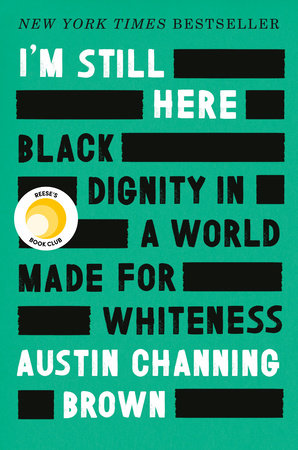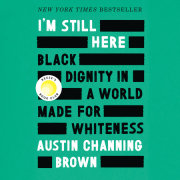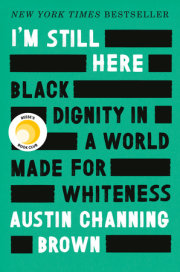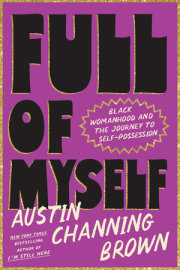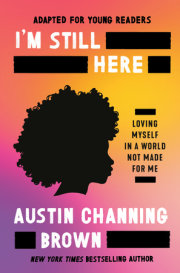1
White People Are Exhausting
White people can be exhausting. Particularly exhausting are white people who don’t know they are white, and those who need to be white. But of all the white people I’ve met—and I’ve met a lot of them in more than three decades of living, studying, and working in places where I’m often the only Black woman in sight—the first I found exhausting were those who expected me to be white.
To be fair, my parents did set them up for failure. In this society where we believe a name tells us everything we need to know about someone’s race, gender, income, and personality, my parents decided to outwit everyone by giving their daughter a white man’s name. When I was growing up, they explained that my grandmother’s maiden name was Austin, and since her only brother didn’t have children, they wanted to make me the last Austin of our family line.
Sounds beautiful, right? Well, it is. It just happens to be half the story.
How did I discover the other half? Through my exhaustion with a white person. We were in my favorite place—our local library, built in a square with an outdoor garden at the center. At seven years old, with books piled high in my arms, I often had to be reminded how many I had already checked out when it came time for our next visit. I am certain my family singlehandedly kept our library funded. We checked out so many books at a time, we would find them under the car seat, between the cushions of our couch, or hiding under the mail on the table.
On this sunny Saturday afternoon, as I stepped up to the front desk to check out my books, I remember the librarian taking my library card and scanning the back as usual. I braced myself, expecting her to announce the fine I owed for the week.
Instead, she raised one eyebrow as the other furrowed and asked, “Is this your card?”
Wondering for a split second if I’d mixed up my card with my mother’s, I nodded my head yes, but hesitantly. “Are you sure?” she said. “This card says Austin.”
I nodded more emphatically and smiled. “Yes, that’s my card.” Perhaps she was surprised a first-grader could rack up such a fine. But when I peered over the counter, I saw that she still hadn’t opened the book covers to stamp the day when I should bring them back (emphasis on should). I waited.
“Are you sure this is your card?” she asked again, this time drawing out sure and your as if they had more than one syllable. I tilted my head in exasperation, rolling my eyes toward the popcorn ceiling. Did she not see all the recent books on my account? Surely this woman didn’t think I didn’t know my own name.
Then it dawned on me. She wasn’t questioning my literacy. She was another in an already long line of people who couldn’t believe my name belonged to me. With a sigh too deep for my young years, I replied, “Yes, my name is Austin, and that is my library card.” She stammered something about my name being unusual as her eyebrows met. I didn’t respond. I just waited for her to hand my books back to me.
My check-outs in hand, I marched over to my mother, who was standing in the VHS section with my little brother. I demanded that she tell me why she named me Austin.
By then, I had gotten used to white people expecting me to be male. It happened every first day of school, at roll call. The boys and girls automatically gravitated to opposite sides of the room, and when my name was called, I had to do jumping jacks to get the teacher’s attention away from the “boys’ section.” So how did I know this wasn’t more of the same? The woman’s suspicion. Because, after I answered her question about my little library card, I still was not believed. I couldn’t have explained it at the time, but I knew this was about more than me not being a boy.
“Why did you give me this name?” I demanded, letting my books fall loudly on the table next to us. My mother, probably wondering how she’d managed to raise a little Judy Blume character of her own, started retelling the story of my grandmother and the Austin family. But I cut her off. “Momma, I know how you came up with my name, but why did you choose it?”
She walked me over to a set of scratchy green armchairs and started talking in a slow, soothing voice. “Austin, your father and I had a really hard time coming up with a name that we both liked. One of us thought to use your grandmother’s maiden name—her last name before she married your grandfather.” I already knew this part of the story. I swung my legs impatiently, waiting for her to tell me more.
“As we said it aloud, we loved it,” she continued. “We knew that anyone who saw it before meeting you would assume you are a white man. One day you will have to apply for jobs. We just wanted to make sure you could make it to the interview.”
My mother watched my face, waiting for a reaction. My brain scrolled through all the times a stranger had said my name but wasn’t talking to me. In every instance, the intended target had been not only a boy but a white boy. I didn’t quite understand my mother’s point about job applications—to that point, the only application I had filled out was probably for the library card in my hand. But one thing became clear. People’s reaction to my name wasn’t just about my gender. It was also about my brown skin. My legs stilled. That’s why the librarian hadn’t believed me. She didn’t know a name like Austin could be stretched wide enough to cloak a little Black girl.
As I grew older, my parents’ plan worked—almost too well. To this day, I receive emails addressed to “Mr. Austin Brown” and voice mails asking if Mr. Brown can please return their call. When I am being introduced to new people, there is often an attempt to feminize my name (“You mean Autumn?”) or to assign my name to my husband. And though I usually note that I am a Black woman in my cover letters, I nonetheless surprise hiring committees when I show up to the interview in all my melanin glory.
Heading into the meeting, I’m dressed up and nervous. Typically I have made it beyond the essay-writing stage, the personality test, or the phone interview with HR. This in-person group interview is usually the final step. I sit in the lobby waiting for someone to collect me. An assistant comes around the corner and looks at me, wondering if I could possibly be the next candidate. A little tentative in case a grave mistake has been made, he asks, “Are you Austin?”
I reply with an enthusiastic yes, pretending I didn’t notice the look of panic that they’d accidentally invited a Black girl to the interview. The tension eases for him as it grips the muscle under my right shoulder blade. I silently take a couple deep breaths as I follow him to the conference room. “Everyone, this is Austin . . .”
Every pair of eyes looks at me in surprise. They look at the person next to them. They blink. Then they look down at my résumé. Every. Single. Time. The person who walked me into the room is still talking, but no one is listening. They are all combing my resume looking for clues. Should they have known? Am I now more impressive or less impressive? What does this mean for the position? For the partners? For the team? They weren’t prepared for this. They were expecting a white man.
It would be comical if it wasn’t so damn disappointing.
Thanks to the progressive circles I usually travel in, most people want to be excited by the “mistake” and ignore all the thoughts, the questions, the change that happened when my body stood before them. But that moment cannot be ignored. The thoughts and questions may dissipate from the interview but never from the mind, the heart. For this becomes the unspoken question for my entire time with an organization: Are we sure she will be a good fit? Or, said another way, Since we didn’t vet her knowing she is a Black woman, are we sure she’ll fit in with our [white] culture? Or should we have hired the white person who came next?
I cannot speak for every Black woman navigating white culture, but this is how being hired usually unfolds for me:
First, I am given a promise, usually from a supervisor, co-worker, or member of the hiring committee, that she is a safe person for me to talk to if anything racist happens. To make the promise of safety feel genuine, she admits that the organization isn’t perfect and assures me that I can share if there is ever an inappropriate comment, a wrong word. That way, the problem can be addressed. Second, I am given a brief account of the organization’s imperfections, a series of stories involving elusive people who no longer belong to the organization. The stories usually concern examples of “missteps”—the time a white person “misspoke” in a board meeting or when a racist email was intercepted by leadership—but they end on a note of hope, expressing how the organization reacted. We invited [insert name of famous Black person] to speak at our annual lunch. We launched an eight-week discussion group on [book by Black author].
But within my first few weeks of working there, the organization’s stereotypes, biases, or prejudices begin to emerge. Comments about my hair. Accolades for being “surprisingly articulate” or “particularly entertaining.” Requests to “be more Black” in my speech. Questions about single moms, the hood, “black-on-black crime,” and other hot topics I am supposed to know all about because I’m Black.
So I bring up the incidents with my safe person—the one who said she wants to know about these encounters—but the response is some version of “Perhaps you misunderstood” or “I’m sure he didn’t mean it like that.” Oftentimes the responsibility to extend compassion falls on me. “You really ought to go back to talk to him. Perhaps if you were more patient, you could see his heart.” So I move on. Rather than dwell on individuals, I speak about the system. About white boardrooms and white leadership teams. About white culture and the organization’s habit of hiring people who perpetuate that culture rather than diversify it. But the white consensus doesn’t want me to point out these things. I was only supposed to name the “bad apples,” so now whiteness has a few names for me. Divisive. Negative. Toxic.
I feel disappointed. I had hoped that this organization, this group of people, might be different from the last one—that they would understand what it means to embody an organization’s diversity in more than numbers. But instead of giving up, I take a step back. I return to pointing out the “bad apples,” hoping that my doing so will lead others to see the systemic. I talk about the woman who touched my hair without permission, and the man who called me “colored” in the hallway. I talk about how when I walk into our church, people still ask me if I am looking for the food pantry. How they greet me as a newcomer every Sunday, even though I have not changed my seat in two years.
I am not interested in getting anyone in trouble; I am trying to clarify what it’s like to exist in a Black body in an organization that doesn’t understand it is not only Christian but also white. But instead of offering empathy and action, whiteness finds new names for me and offers ominous advice. I am too sensitive, and should be careful with what I report. I am too angry, and should watch my tone when I talk about my experiences. I am too inflexible, and should learn to offer more grace to people who are really trying.
It’s exhausting.
White people who expect me to be white have not yet realized that their cultural way of being is not in fact the result of goodness, rightness, or God’s blessing. Pushing back, resisting the lie, is hella work.
It’s work to be the only person of color in an organization, bearing the weight of all your white co-workers’ questions about Blackness.
It’s work to always be hypervisible because of your skin—easily identified as being present or absent—but for your needs to be completely invisible to those around you.
It’s work to do the emotional labor of pointing out problematic racist thinking, policies, actions, and statements while desperately trying to avoid bitterness and cynicism.
It’s work to stay open to an organization to learn new skills without drinking in the cultural expectations of body size, personality, interests, and talents most valued according to whiteness.
Quite frankly, the work isn’t just tedious. It can be dangerous for Black women to attempt to carve out space for themselves—their perspective, their gifts, their skills, their education, their experiences—in places that haven’t examined the prevailing assumption of white culture. The danger of letting whiteness walk off with our joy, our peace, our sense of dignity and self-love, is ever present. But it doesn’t have to be this way. Togetherness across racial lines doesn’t have to mean the uplifting of whiteness and harming of Blackness. And even though the Church I love has been the oppressor as often as it has been the champion of the oppressed, I can’t let go of my belief in Church—in a universal body of belonging, in a community that reaches toward love in a world so often filled with hate. I continue to be drawn toward the collective participation of seeking good, even when that means critiquing the institution I love for its commitment to whiteness.
This book is my story about growing up in a Black girl’s body. There is nothing profound about where my story takes place. I didn’t grow up in another country, in the Deep South or the hood. I grew up around white people in a family-friendly middle-class neighborhood. There was neither devastating poverty nor incredible wealth, and the demographics of my neighborhood and schools often mimicked America as a whole—mostly white, but never exclusively so.
I also grew up in the late eighties and early nineties, the height of America’s supposed commitment to racial color blindness. At my Christian elementary school, we sang, “Jesus loves the little children . . . red and yellow, black and white, all are precious in his sight.” In alignment with this song, white people often professed, “I don’t even see color,” reassuring me that I would be safe from racism with them. And yet, I learned pretty early in life that while Jesus may be cool with racial diversity, America is not. The ideology that whiteness is supreme, better, best, permeates the air we breathe—in our schools, in our offices, and in our country’s common life. White supremacy is a tradition that must be named and a religion that must be renounced. When this work has not been done, those who live in whiteness become oppressive, whether intentional or not.
Copyright © 2018 by Austin Channing Brown. All rights reserved. No part of this excerpt may be reproduced or reprinted without permission in writing from the publisher.

